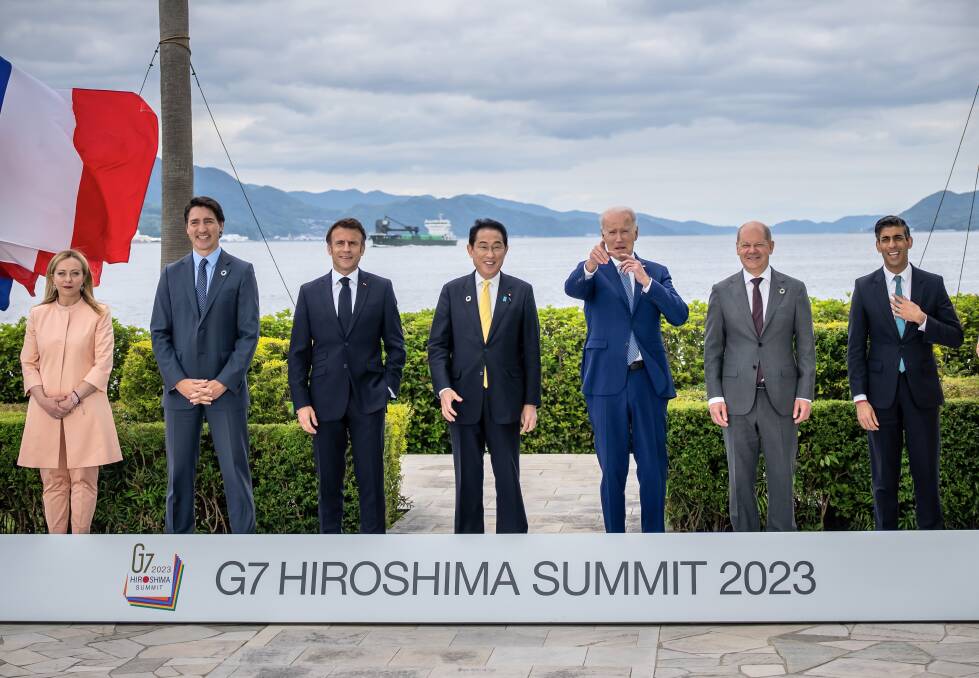
Resistance to China just keeps growing. It's been the trend for the past six years or so and shows no sign of stopping.
Subscribe now for unlimited access.
or signup to continue reading
In the past week the world's seven largest developed economies delivered their strongest-ever rebuke to China, while Papua New Guinea signed a security deal with the US, and India and Australia moved closer together.
Beijing was infuriated by the G7 countries saying they would cut economic reliance on China and by their opposition to its human rights violations and attempts to seize the South China Sea.
But China shows no sign of backing off. It has created the rising wall of resistance to it and seems unable to moderate its behaviour. When its wrongdoing prompts a reaction, it often responds by annoying other countries even more.
Expect the cycle to continue.
The G7 - Britain, Canada, France, Germany, Italy, Japan and the US - said they were not trying to decouple from China, but they then went on to say they'd do just what decoupling is understood to mean.
"We recognize that economic resilience requires de-risking and diversifying," they said after their meeting in Hiroshima. "We will take steps, individually and collectively, to invest in our own economic vibrancy. We will reduce excessive dependencies in our critical supply chains."
Just a few years ago, if a Chinese product offered the best value for money, a foreign government would rarely have seen a reason why it should not be imported. Now the democracies are alive to the risk that China could use its dominance of certain markets as a weapon to force other countries to do as it says.
The fear is justified. China has already used economic coercion against Australia, South Korea and, in a big mistake, EU member Lithuania, in all cases for political objectives.
Chinese telecommunications equipment is a particular risk, because it could be used for espionage or to attack infrastructure. Maybe Australia will be seen as having kicked off the whole decoupling movement in 2012 when it excluded Chinese supplier Huawei from the National Broadband Network.
In Beijing, the foreign ministry reacted to the G7 in part by using a line that plays well with people who imagine that the world doesn't have a problem with China but, rather, only the US has. "We urge the G7 not to become an accomplice in economic coercion," the ministry said, implying that the US was calling the tune.
The G7 also flatly rejected China's "expansive maritime claims in the South China Sea" and expressed concern about human rights, particularly in Tibet, Xinjiang and Hong Kong. Saying anything about human rights in China is sure to send the ministry into a tizz, since its view is that the Chinese Communist Party has a perfect right to crush anyone in China as it sees fit.
Chinese intelligence-gathering and hacking activities are reliable generators of international dislike for the country.
MORE AGE OF THE DRAGON:
Sending that ridiculous intelligence-gathering balloon over the US this year was a spectacular own goal for Beijing, riling Americans who normally paid no attention to international affairs. And this week Microsoft revealed a Chinese government hack into US telecommunications links with Asia, getting ready to disrupt them.
Meanwhile, the US is stepping up its support for PNG, years after China began working diligently on influencing Pacific countries. There will be a PNG-US defence cooperation agreement, which will presumably fall short of an alliance but nonetheless enhance the idea in Port Moresby that Washington is concerned about PNG's security.
The US Coast Guard will also help PNG with maritime law enforcement, which typically means getting rid of foreign fishing ships.
Helpfully, the Chinese fishing fleet is the world's most rapacious. So we can expect Papua New Guineans to see US Coast Guard ships as good guys driving off Chinese fishing ships playing the role of bad guys. A nice, simple message.
There is embarrassment in that for Australia. As useful as it is for Papua New Guineans to feel that the US is assisting them, we must ask how Australia has failed to do enough to help PNG control its exclusive economic zone. The situation should never have got to the stage of needing US assistance; Australian ships and aircraft should have been there.
If there is any country we are responsible for helping, it's PNG. We have a foreign aid budget of $4.8 billion. As much as possible, it should be going into our region.
Finally, Indian Prime Minister Narendra Modi came to Australia, despite a meeting of the Quad here being shifted to Hiroshima. The Quad is a partnership of Australia, India, Japan and the US that has various worthy declared aims, such as counter-terrorism and addressing climate change, but is really driven by a desire to jointly resist China.
Similarly, the here-and-now achievements of Modi's visit were mainly economic, but China will have noted with discomfort the larger significance: a tightening relationship between two countries it regards as adversaries.
Still, we should not overestimate India's immediate importance to us. True, in the long run it will be able to counterbalance China's economic and therefore military power. And, strategically, India's location presents interesting problems for any Chinese attempt at pushing militarily through and beyond South-East Asia.
But we can't get our hopes up. India has always been careful to steer an independent path in foreign policy.
Japan, on the other hand, is highly engaged in resisting China, has an iron alliance with the US and has the world's third-largest economy. For the moment, it is a more important friend for us.
- Bradley Perrett was based in Beijing as a journalist from 2004 to 2020.


